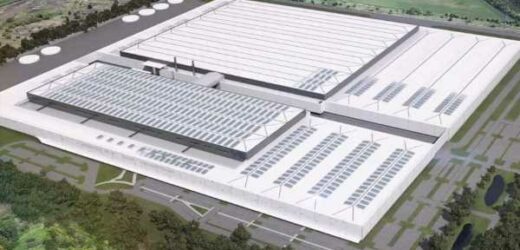West Midlands Gigafactory give a CGI preview of factory plans
We use your sign-up to provide content in ways you’ve consented to and to improve our understanding of you. This may include adverts from us and 3rd parties based on our understanding. You can unsubscribe at any time. More info
Britishvolt, the firm hoping to build the UK’s first gigafactory (a plant producing batteries for electric vehicles [EVs] on scale) has vowed to press ahead with plans to set up the site in Blyth, Northumberland, following speculation that the firm was on the brink of collapse, Express.co.uk has exclusively been told. As the UK scrambles to phase out the sale of new petrol and diesel cars by 2030, Britishvolt’s plan to build a £3.8billion gigafactory had been tipped to bring a huge boost to the UK’s EV rollout
But after securing a £100million grant from the Government to help construct the plant, Britishvolt called on the Business Department to bring forward £30million to help keep the start-up afloat and the UK’s EV dreams alive as it ran into financial trouble.
While the Government refused to do so, the firm was handed a lifeline by undisclosed investors, which Britishvolt’s Chief Communication Officer Ben Kilbey says will help push the company in the right direction.
Speaking exclusively to Express.co.uk, he said: “The case injection allows us to bridge to larger, more strategic investments to ensure the successful delivery of a domestic UK battery cell industry.
“There is an outpouring of support (for Britishvolt) from the general public and private industry, more and more investors are coming forward on the back of the recent news as they see the strength of our business and our technology. We also have the best Gigasite in the UK, if not Europe.”
This also comes after the Telegraph reported that Aston Martin’s former head honcho Andy Palmer is interested in purchasing the Blyth site if Britishvolt went bust.


Mr Palmer chairs a Slovakian business called InoBat which reportedly held talks with Britishvolt’s potential administrators EY to take on plans to build the plant.
The Slovakian firm had already earmarked another British site at Teesside as one of two locations to build an EV battery-making factory, with its second potential site in Valladolid, in Spain.
But a source told The Telegraph: “If Blyth became available, Blyth is potentially a better site.”
However, Mr Kilbey has ruled out any kind of takeover. He told Express.co.uk: “Now is not the time to be second-guessing the strategic importance of the energy transition.
“Now is the time for both public and private sectors to unite and ensure a successful energy transition, collaboratively. Domestic battery cell production is an essential element for that success. Everyone on of us needs to look the same way and accept that changes are needed to get this right. New ways of doing things are essential for success.”

“This is a once-in-a-lifetime opportunity for us all. The invasion of Ukraine has only highlighted the dire need for a switch to renewable energy sources to empower energy independence and security.”
This also comes after the Britishvolt production start date was delayed as soaring energy costs sparked difficulties for the firm.
This cast a certain degree of doubt over the plans which former Prime Minister Boris Johnson has previously claimed was a marker of “UK’s place at the helm of the global green industrial revolution”.
The site, which lies right in the heart of the ‘Red Wall’, was also added bonus for Mr Johnson’s 10 Point Plan for a Green Industrial Revolution and his levelling-up agenda, helping to explain why the former Prime Minister happily made the first funding commitment back in January through the Government’s Automotive Transformation Fund (ATF), a programme worth up to £1billion created to support large-scale industrialisation and for the development of a high-value EV supply chain in the UK.
But when £30million of the funds were not provided to Britishvolt ahead of schedule, there were fears the firm would collapse.
DON’T MISS
Archaeologists stumble across vital across vital clue about Babylon [REVEAL]
RAF shoots down 53 drones in ‘message to Putin’ [INSIGHT]
Heat pump scheme torn apart as Rishi urged to scrap ‘immoral waste’ [REPORT]


However, the last-minute investment appears to have got Biritshvolt out of the mud. A spokesperson said in a statement: “We have previously spoken about the need to evolve our business strategy in response to challenging external factors and continue to explore both short- and long-term funding streams that will enable us to deliver on our plans to build a thriving localised, sustainable battery ecosystem based on next-generation cell technology.
“While the weakening economic situation is negatively impacting much business investment at present, at Britishvolt we are continuing to pursue positive ongoing discussions with potential investors. In addition, we have also received promising approaches from several more international investors in the past few days.
“The result is we have now secured the necessary near-term investment that we believe enables us to bridge over the coming weeks to a more secure funding position for the future. To further reduce our near-term costs, our dedicated employee team has also voluntarily agreed to a temporary salary reduction for the month of November.
“We want to thank our employees, suppliers & investors, for their continuing belief in Britishvolt. It is important that Britishvolt is a success not only for the close to 300 employees currently working for the company, but also for the many thousands of jobs we intend to create in the UK as we progress our plans. The “Britishvolt Effect” is also of huge strategic importance to UK plc. and the country’s standing on the global battery stage.”
Source: Read Full Article


